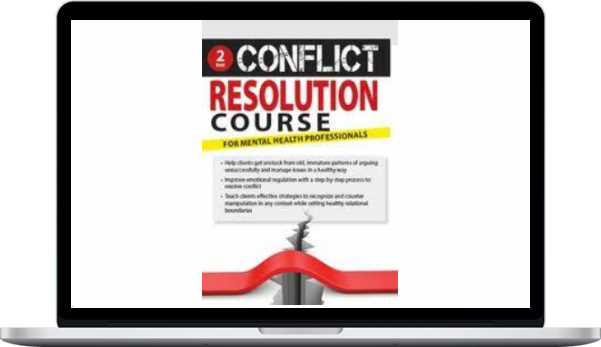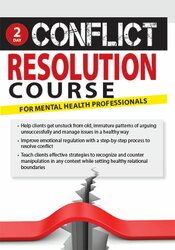Alan Godwin – 2-Day Conflict Resolution Course for Mental Health Professionals
$440.00 $62.00
»Delivery: Within 24hs
Description
Alan Godwin – 2-Day Conflict Resolution Course for Mental Health Professionals
Description Of 2-Day Conflict Resolution Course for Mental Health Professionals
Clients walk into your office every day with different complaints and yet there is a commonality that is easily missed – the context in which their struggles often develop is conflict – poorly-handled, unresolved conflict.
Conflict is unavoidable, whether it’s in a marriage, family, work, or friendship context though it’s not always obvious that poor conflict management skills are at the heart of client’s problems. Their lack of conflict management skills can lead to struggles with depression, anxiety, and a host of other issues that bring them to your office. These problems become even more significant if the client has a conflict with an emotional manipulator who has neither the ability nor desire to resolve problems.
Many mental health clinicians are not skilled at conflict resolution and it is an area often neglected in many training programs. Alternative Dispute Resolution expert, Dr. Alan Godwin, combines decades of clinical practice and the latest behavioral research to offer you comprehensive solutions and an easy-to-understand conflict resolution system you will be ready to use the next day to engage and empower your clients.
Don’t miss out on this unique chance to expand your clinical skill set, your clients are counting on you.
What you’ll learn in 2-Day Conflict Resolution Course for Mental Health Professionals
Objectives
- Identify four categories of conflicts clients experience in relation to assessment and treatment planning.
- Describe the operation of the conflict trap and its different versions as it relates to treatment outcomes.
- Articulate the negative impact of poorly-handled conflict on clients’ mental health.
- Distinguish the cognitive skills necessary to implement the reasoning process and put to practical use in-session.
- Demonstrate the specific steps involved in solving conflict problems to improve client’s level of functioning.
- Explore the therapist’s role to facilitate the client’s problem-solving process in session.
- Articulate the reasoning deficiencies that disable a client from participating in the conflict-resolution process and its clinical implications.
- Describe the manipulator’s methods of exacerbating conflict for purposes of client psychoeducation.
- Assess the psychological impact of conflict with an emotional manipulator to inform clinical treatment interventions.
- Articulate what a client must do in session to move from conflict to resolution.
- Evaluate and restructure the client’s interpersonal interactions as an approach to manage the client’s relationship with an emotional manipulator.
- Describe the objectives for healthy conflict with difficult clients as it relates to case conceptualization.
Outline
Step by Step Clinical Guide to Resolving Conflicts
- Categorize conflict to determine treatment approach
- Preference problems
- Perception issues
- Difficulties with process
- Feeling pressure
- Assess operation of the conflict trap
- Heightened altercation
- Inarticulate dispute
- Combination disagreement
- Psychological consequences of poorly-handled conflict
- Recurrent complications
- Diminished attachment
- Alienation from others
- Emotional distress
- Proven strategies for healthy conflict management and resolution
- Teach clients to defuse argument provocation
- Interventions to manage fight or flight reactions
- Strategies to modify immature patterns of behavior
- Assess ability to resolve conflicts
- Teach clients 5 steps of the problem-solving process
- Narrow
- Validate
- Select
- Specify
- Adjust
- Implement resolution of conflict in clinical practice
- Focus on process, not issues
- Target one issue at a time
- Achieve understanding
- Compromise and define the solution
- Adjust if the stated solution doesn’t work as intended
- Conflict management techniques for improved mental health
- Exercises to increase cognitive skills
- Interventions to foster secure attachment
- Enhance neural connections
- Build emotional harmony with emotional intelligence
- Case Study: The Conflict Resolution Process
Advanced Conflict Resolution Skills for Difficult Clients
- Assess cognitive impairments in clients with limited reasoning abilities
- Wrong vs right
- Strengths vs weaknesses
- Truth vs blame
- Consideration vs selfishness
- Reliability vs inconsistency
- Identify implicit roles clients play and select appropriate conflict resolution strategy
- Master – “I’m in control”
- Martyr – “I’m the victim”
- Messiah – “I’m the hero”
- Mute – “You should know my role”
- Mirror – “It’s not me, it’s you”
- Strategies to end an unhealthy circular process of conflict
- Prevent vulnerabilities from being exploited
- Interventions to manage reactions
- Teach clients to reason, not antagonize
- Psychological impact of conflict with a manipulator
- Physiological response
- Disorientation from reality
- Emotional debilitation
- Strategies to re-structure interpersonal interactions
- Redefine depth of a relationship
- Assess value and limitations
- Evaluate growth opportunities
- Interventions to move from conflict to resolution
- Develop a plan
- Respond vs. react
- Teach clients to set boundaries
- Assess level of functioning in response to healthy conflict resolution
- Intrinsic motivation to change
- Limited potential for growth
- Dangerous behavior
- Determine clinical treatment goals
- Accurately assess patterns of behavior
- Reduce emotional distress
- Respond instead of react
- Create realistic expectations
- Set healthy boundaries
- Establish support systems
- Accept relational limitations
- Objectives for healthy conflict with these clients
- Restrained problems
- Empowerment
- Redefine communication expectations
- Improved mental health
- Case Study: The Drama Management Process
More courses from the same author: Alan Godwin
Delivery Policy
When will I receive my course?
You will receive a link to download your course immediately or within 1 to 21 days. It depends on the product you buy, so please read the short description of the product carefully before making a purchase.
How is my course delivered?
We share courses through Google Drive, so once your order is complete, you'll receive an invitation to view the course in your email.
To avoid any delay in delivery, please provide a Google mail and enter your email address correctly in the Checkout Page.
In case you submit a wrong email address, please contact us to resend the course to the correct email.
How do I check status of my order?
Please log in to HealingCourse account then go to Order Page. You will find all your orders includes number, date, status and total price.
If the status is Processing: Your course is being uploaded. Please be patient and wait for us to complete your order. If your order has multiple courses and one of them has not been updated with the download link, the status of the order is also Processing.
If the status is Completed: Your course is ready for immediate download. Click "VIEW" to view details and download the course.
Where can I find my course?
Once your order is complete, a link to download the course will automatically be sent to your email.
You can also get the download link by logging into your HealingCourse account then going to Downloads Page.
Related products
Total sold: 2









